Richard L. Daft - Management. 9th ed., 2010
Подождите немного. Документ загружается.

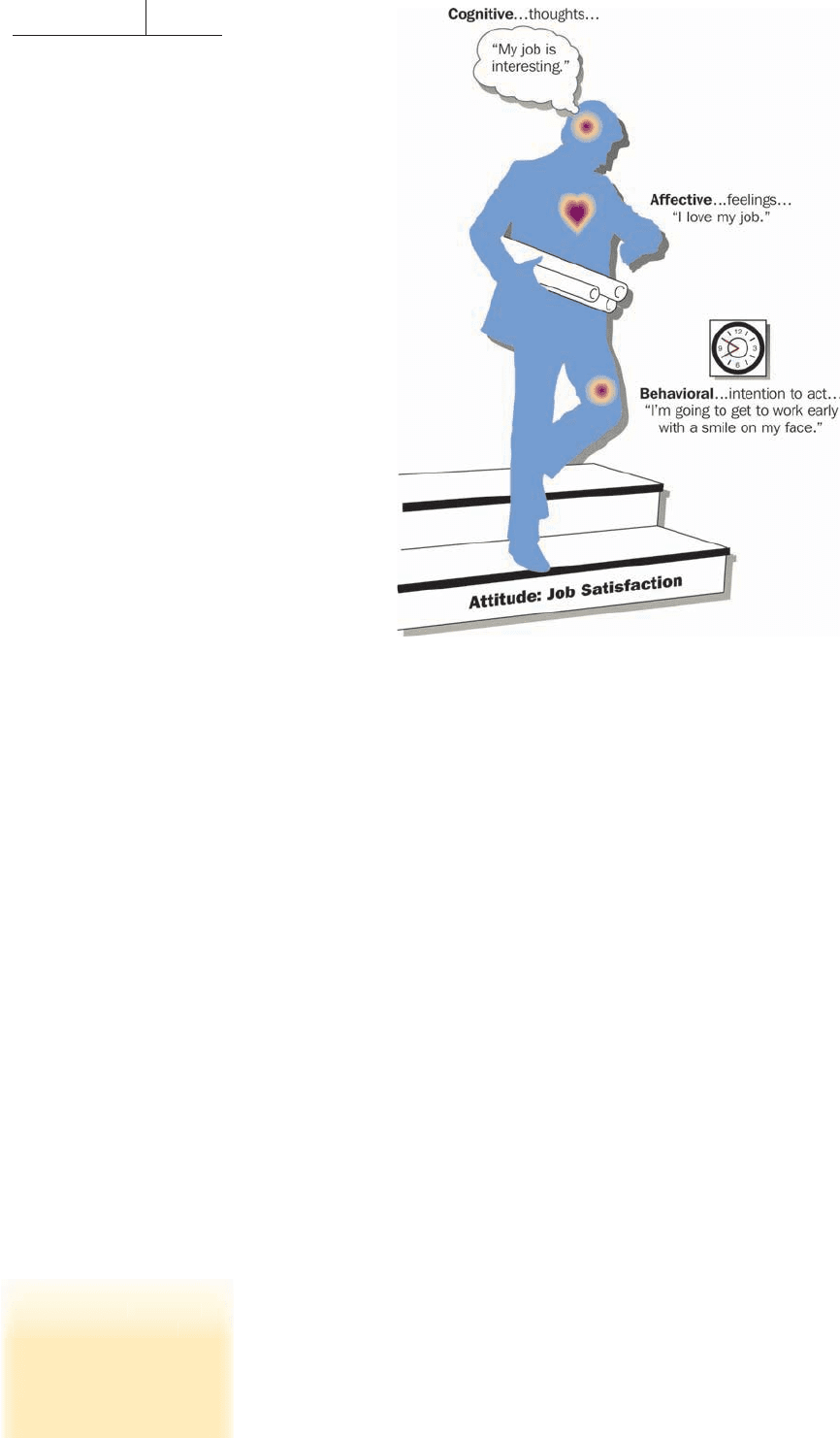
PART 5 LEADING380
High-Performance Work Attitudes
The attitudes of most interest to managers are those related to work, especially
attitudes that in uence how well employees perform. Two attitudes that might
relate to high performance are satisfaction with one’s job and commitment to the
organization.
Job Satisfaction A positive attitude toward one’s job is called job satisfaction. In
general, people experience this attitude when their work matches their needs and
interests, when working conditions and rewards (such as pay) are satisfactory, when
they like their coworkers, and when they have positive relationships with supervi-
sors. You can take the quiz in Exhibit 13.2 to better understand some of the factors
that contribute to job satisfaction.
Many managers believe job satisfaction is important because they think satis ed
employees will do better work. In fact, research shows that the link between satis-
faction and performance is generally small and is in uenced by other factors.
7
For
example, the importance of satisfaction varies according to the amount of control the
employee has; an employee doing routine tasks may produce about the same output
no matter how he or she feels about the job. Managers of today’s knowledge work-
ers, however, often rely on job satisfaction to keep motivation and enthusiasm high.
They can’t afford to lose talented, highly skilled workers. Regrettably, a survey by
International Survey Research found that Gen X employees, those who are carrying
the weight of much of today’s knowledge work, are the least satis ed of all demo-
graphic groups.
8
Managers create the environment that determines whether employees have
positive or negative attitudes toward their jobs.
9
A related attitude is organizational
commitment.
EXHIBIT 13.1
Components of an Attitude
j
j
j
j
j
jo
jo
job
satisfaction
A
p
p
ositive
a
a
a
at
tt
at
tt
a
a
a
it
it
u
d
d
e
t
t
ow
d
ar
d
on
’
e
’
s
j
j
o
j
b
b
.
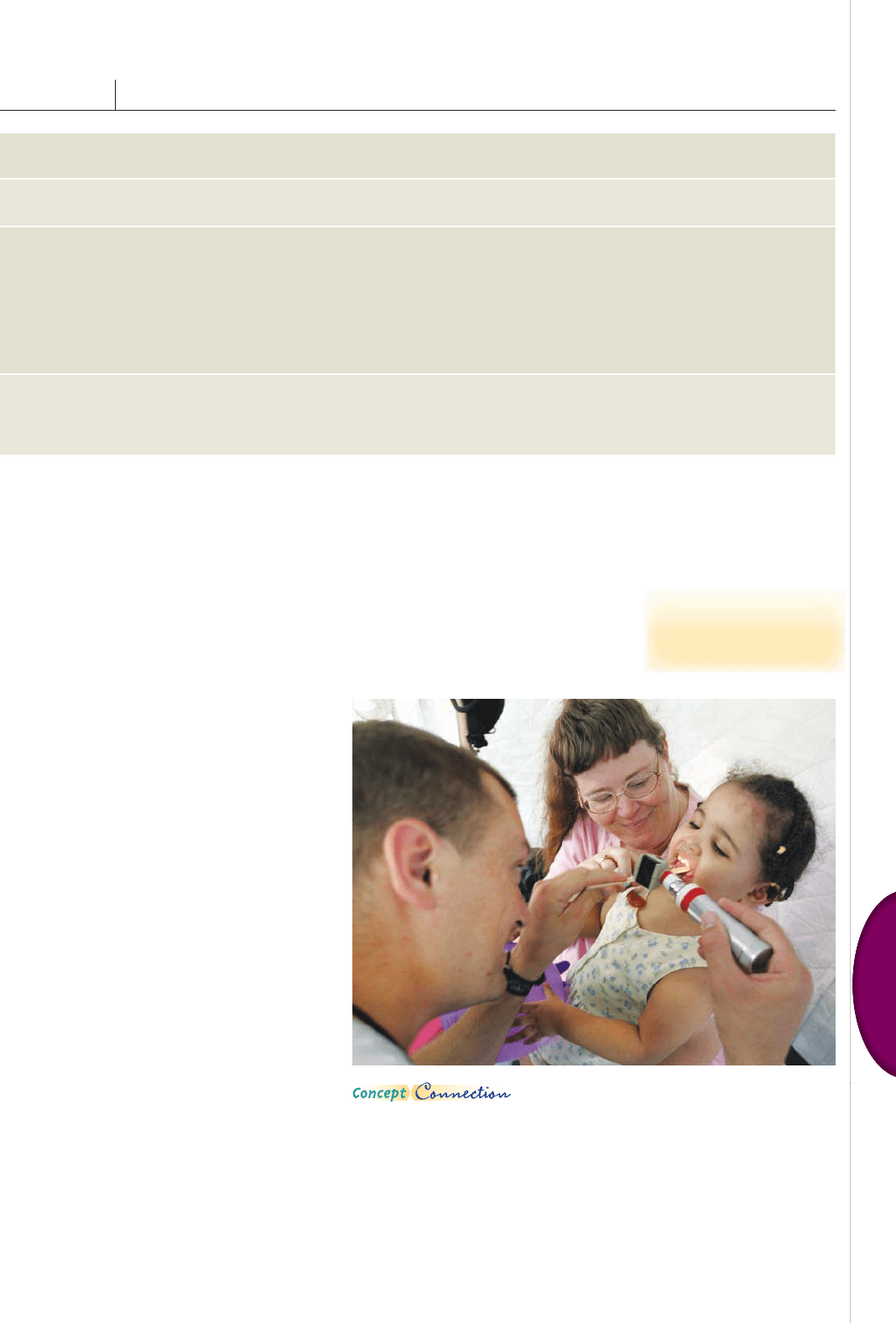
CHAPTER 13 DYNAMICS OF BEHAVIOR IN ORGANIZATIONS 381
5
Leading
Organizational Commitment Organizational commitment refers to an employ-
ee’s loyalty to and engagement with the organization. An employee with a high
degree of organizational commitment is likely to say we when talking about the com-
pany. Such a person likes being a part of the organization and tries to contribute to its
success. This attitude is illustrated by an incident at the A. W. Chesterton company,
a manufacturer of mechanical seals and pumps. When two Chesterton pumps that
supply water on Navy ship USS John F. Kennedy failed on a Saturday night just before
the ship’s scheduled departure, the team
that produces the seals swung into action.
Two members worked through the night
to make new seals and deliver them to be
installed before the ship left port.
10
Most managers want to enjoy the ben-
e ts of loyal, committed employees, includ-
ing low turnover and employee willingness
to do more than the job’s basic require-
ments. Results of a Towers Perrin-ISR sur-
vey of more than 360,000 employees from
41 companies around the world indicate
that companies with highly committed
employees perform better.
11
Alarmingly,
another recent survey suggests that com-
mitment levels around the world are rela-
tively low. Only one- fth of the respondents
were categorized as fully engaged, that is,
re ecting a high level of commitment. In
the United States, the percentage classi ed
as fully engaged was 29 percent, compared
to 54 percent in Mexico, 37 in percent in
Brazil, and 36 percent in India, Countries
where employees re ect similar or lower
levels of commitment than the U. S. include
Canada at 23 percent, Spain at 19 percent,
Germany at 17 percent, China at 16 percent,
the United Kingdom at 14 percent, France at
12 percent, and Japan at only 3 percent.
12
EXHIBIT 13.2 Rate Your Job Satisfaction
Think of a job—either a current or previous job—that was important to you, and then answer the following questions with respect to
how satisfi ed you were with that job. Please answer the six questions with a number 1–5 that refl ects the extent of your satisfaction.
1 Very dissatisfi ed 3 Neutral 5 Very satisfi ed
2 Dissatisfi ed 4 Satisfi ed
1. Overall, how satisfi ed are you with your job? 1 2 3 4 5
2. How satisfi ed are you with the opportunities to learn new things? 1 2 3 4 5
3. How satisfi ed are you with your boss? 1 2 3 4 5
4. How satisfi ed are you with the people in your work group? 1 2 3 4 5
5. How satisfi ed are you with the amount of pay you receive? 1 2 3 4 5
6. How satisfi ed are you with the advancement you are making 1 2 3 4 5
in the organization?
Scoring and Interpretation: Add up your responses to the six questions to obtain your total score: ______. The questions represent
various aspects of satisfaction that an employee may experience on a job. If your score is 24 or above, you probably feel satisfi ed with
the job. If your score is 12 or below, you probably do not feel satisfi ed. What is your level of performance in your job, and is your per-
formance related to your level of satisfaction?
SOURCES: These questions were adapted from Daniel R. Denison, Corporate Culture and Organizational Effectiveness (New York: John Wiley, 1990); and John D. Cook, Susan J.
Hepworth, Toby D. Wall, and Peter B. Warr, The Experience of Work: A Compendium and Review of 249 Measures and their Use (San Diego, CA: Academic Press, 1981).
“To shake the hand of someone who was nearly dead—
there’s no feeling like that in the world.” That’s how one physician assistant (PA)
explained why he fi nds the profession so fulfi lling. Job satisfaction is extraordinarily
high for PAs, such as Jim Johnson, shown here helping patients in a makeshift medical
tent after Hurricane Katrina hit Gulfport, Mississippi. A recent survey reported that
90 percent would make the same career choice all over again. In addition to good pay
and fl exible working conditions, PAs relish the autonomy of the job, a chance to help
others, the challenge of diagnosing and treating a variety of ailments, and working as
part of a team.
MARCIO JOSE SANCHEZ/ASSOCIATED PRESS
o
o
o
o
o
org
anizational commitmen
t
t
t
t
t
L
L
L
L
L
Loy
L
L
L
Loy
alt
alt
yt
y
t
oa
o
a
nd
nd
hea
hea
vy
vy
inv
inv
olv
olv
e
e-
m
m
m
m
m
me
men
m
m
t in one
’
s or
g
a
g
nization.
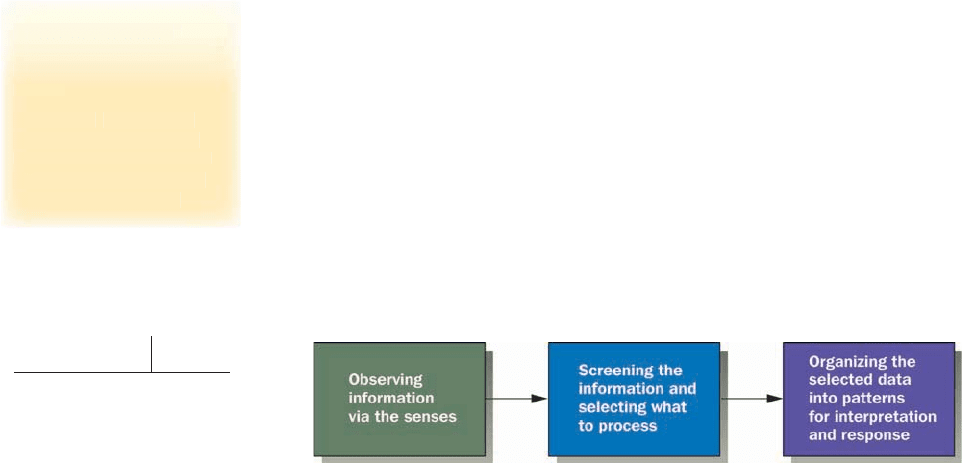
PART 5 LEADING382
Trust in management decisions and integrity is one important component of orga-
nizational commitment.
13
Unfortunately, in recent years, many employees in the U.S.
have lost that trust. Just 28 percent of people surveyed by Fast Company magazine
said they think the CEO of their company has integrity. Another survey by Ajilon
Professional Staf ng found that only 29 percent of employees reported believing their
boss cared about them and looked out for their interests.
14
Managers can promote
stronger organizational commitment by being honest and trustworthy in their busi-
ness dealings, keeping employees informed, giving them a say in decisions, provid-
ing the necessary training and other resources that enable them to succeed, treating
them fairly, and offering rewards they value.
Confl icts Among Attitudes
Sometimes a person may discover that his or her attitudes con ict with one
another or are not re ected in behavior. For example, a person’s high level of orga-
nizational commitment might con ict with a commitment to family members. If
employees routinely work evenings and weekends, their long hours and dedica-
tion to the job might con ict with their belief that family ties are important. This
con ict can create a state of cognitive dissonance, a psychological discomfort
that occurs when individuals recognize inconsistencies in their own attitudes and
behaviors.
15
The theory of cognitive dissonance, developed by social psychologist
Leon Festinger in the 1950s, says that people want to behave in accordance with
their attitudes and usually will take corrective action to alleviate the dissonance
and achieve balance.
In the case of working overtime, people who can control their hours might
restructure responsibilities so that they have time for both work and family. In
contrast, those who are unable to restructure workloads might develop an unfa-
vorable attitude toward the employer, reducing their organizational commitment.
They might resolve their dissonance by saying they would like to spend more time
with their kids but their unreasonable employer demands that they work too many
hours.
PERCEPTION
Another critical aspect of understanding behavior is perception. Perception is the
cognitive process people use to make sense out of the environment by selecting, orga-
nizing, and interpreting information from the environment. Because of individual
differences in attitudes, personality, values, interests, and so forth, people often “see”
the same thing in different ways. A class that is boring to one student might be fasci-
nating to another. One student might perceive an assignment to be challenging and
stimulating, whereas another might nd it a silly waste of time.
We can think of perception as a step-by-step process, as shown in Exhibit 13.3.
First, we observe information (sensory data) from the environment through our
senses: taste, smell, hearing, sight, and touch. Next, our mind screens the data and
will select only the items we will process further. Third, we organize the selected data
EXHIBIT 13.3
The Perception Process
c
c
c
c
c
cog
nitive
d
issonance A c
on
n-
-
-
d
d
d
d
it
d
it
d
d
i
i
on
i
i
n
h
w
h
ih
i
c
h
t
t
wo a
tti
tti
td
t
u
d
es
o
o
o
o
or
r
o
o
or
r
ab
a
b
eha
eha
vio
vio
ra
r
a
nd
nd
an
an
att
att
itu
itu
de
de
c
c
c
c
co
o
nfl ict
.
p
p
p
p
p
ercept
i
on
Th
e cognitive
p
p
p
p
p
rocess peop
l
e use to ma
k
e
s
s
s
s
se
e
nse out o
f
t
h
e environment
b
b
b
b
by
y
b
selecting, organizing, and
i
i
i
in
in
n
nt
nt
i
erp
p
retin
g
g
information
.
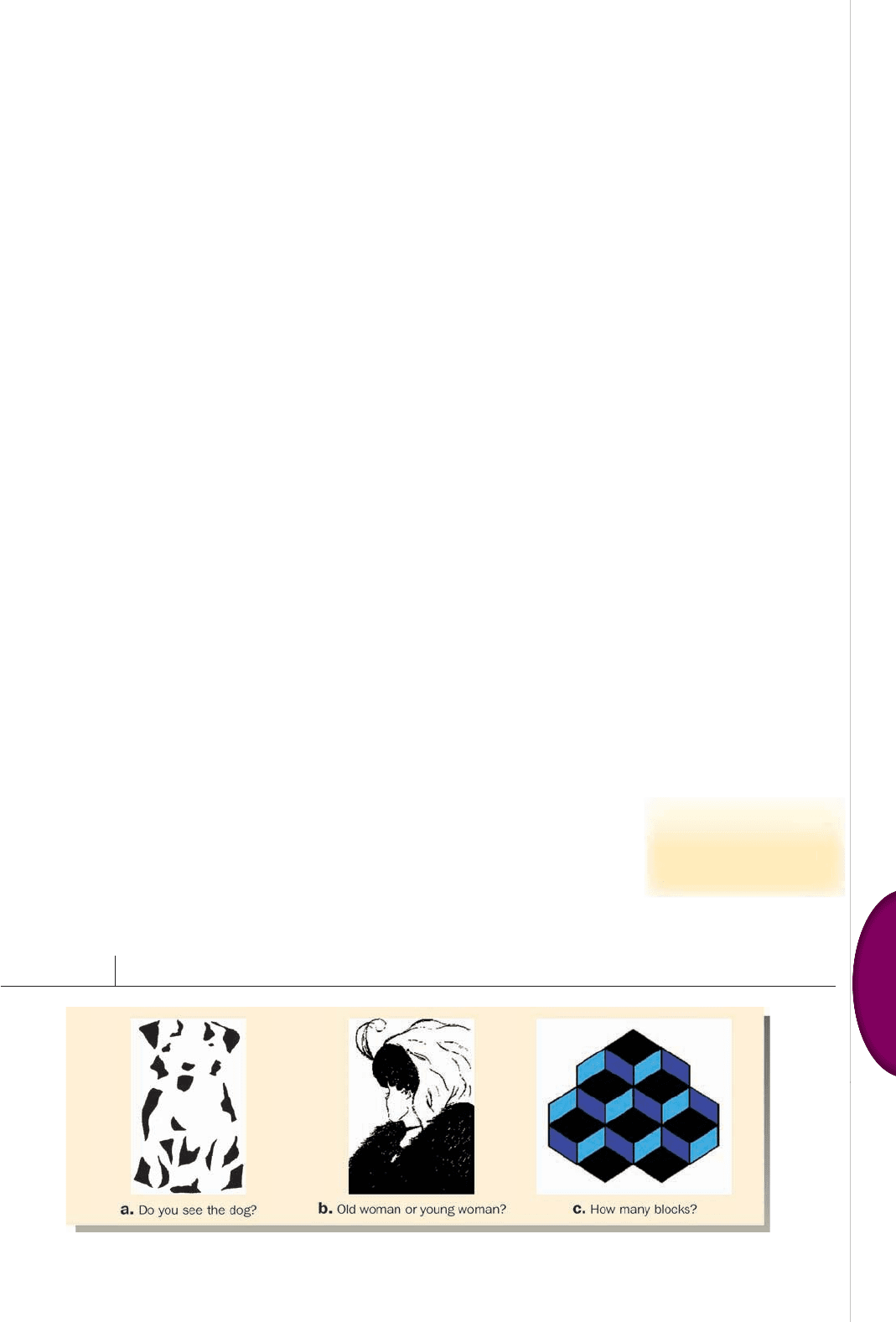
CHAPTER 13 DYNAMICS OF BEHAVIOR IN ORGANIZATIONS 383
5
Leading
into meaningful patterns for interpretation and response. Most differences in percep-
tion among people at work are related to how they select and organize sensory data.
You can experience differences in perceptual organization by looking at the visuals
in Exhibit 13.4. What do you see in part a of Exhibit 13.4? Most people see this as a dog,
but others see only a series of unrelated ink blots. Some people will see the gure in
part b as a beautiful young woman while others will see an old one. Now look at part c.
How many blocks do you see—six or seven? Some people have to turn the gure
upside down before they can see seven blocks. These visuals illustrate how complex
perception is.
Perceptual Selectivity
We are bombarded by so much sensory data that it is impossible to process it all.
Thus, we tune in to some things and tune out others. Perceptual selectivity is the
process by which individuals subconsciously screen and select the various objects
and stimuli that vie for their attention.
People typically focus on stimuli that satisfy their needs and that are consis-
tent with their attitudes, values, and personality. For example, employees who
need positive feedback to feel good about themselves might pick up on positive
statements made by a supervisor but tune out most negative comments. A supervi-
sor could use this understanding to tailor feedback in a positive way to help the
employee improve work performance. The in uence of needs on perception has
been studied in laboratory experiments and found to have a strong impact on what
people perceive.
16
Characteristics of the stimuli themselves also affect perceptual selectivity. People
tend to notice stimuli that stand out against other stimuli or that are more intense
than surrounding stimuli. Examples would be a loud noise in a quiet room or a
bright red dress at a party where most women are wearing basic black. People also
tend to notice things that are familiar to them, such as a familiar voice in a crowd, as
well as things that are new or different from their previous experiences. In addition,
primacy and recency are important to perceptual selectivity. People pay relatively
greater attention to sensory data that occur toward the beginning of an event or
toward the end. Primacy supports the old truism that rst impressions really do
count, whether it be on a job interview, meeting a date’s parents, or participating in
a new social group. Recency re ects the reality that the last impression might be a
lasting impression. For example, Malaysian Airlines discovered its value in building
customer loyalty. A woman traveling with a nine-month-old might nd the ight
itself an exhausting blur, but one such traveler enthusiastically told people for years
how Malaysian Airlines ight attendants helped her with baggage collection and
ground transportation.
17
EXHIBIT 13.4 Perception—What Do You See?
p
p
p
p
p
per
ceptua
l
se
l
ectivit
y
The
The
p
p
p
p
ro
p
p
p
p
ro
p
p
p
ces
ces
b
sb
s
b
yw
y
w
y
hi
hic
hic
hi
hi
h
i
di
ndi
ndi
id
vid
vid
l
ual
ual
s
s
s
s
s
s
c
c
reen an
d
se
l
ect t
h
e various
s
s
s
st
st
ti
ti
s
s
mul
m
i t
h
at vie
f
or t
h
eir attent
ion
n
n
n
.
.

PART 5 LEADING384
Perceptual Distortions
Once people select the sensory data to be perceived, they begin grouping the data
into recognizable patterns (perceptual organization). Of particular concern in the
work environment are perceptual distortions, errors in perceptual judgment that
arise from inaccuracies in any part of the perceptual process.
One common perceptual error is stereotyping, the tendency to assign an individ-
ual to a group or broad category (e.g., female, black, elderly; or male, white, disabled)
and then to attribute widely held generalizations about the group to the individual.
Thus, someone meets a new colleague, sees he is in a wheelchair, assigns him to the
category “physically disabled,” and attributes to this colleague generalizations she
believes about people with disabilities, which may include a belief that he is less able
than other coworkers. However, the person’s inability to walk should not be seen as
indicative of lesser abilities in other areas. Stereotyping prevents people from truly
knowing those they classify in this way. In addition, negative stereotypes prevent tal-
ented people from advancing in an organization and fully contributing their talents
to the organization’s success.
The halo effect occurs when the perceiver develops an overall impression of
a person or situation based on one characteristic, either favorable or unfavorable.
In other words, a halo blinds the perceiver to other characteristics that should be
used in generating a more complete assessment. The halo effect can play a signi -
cant role in performance appraisal, as we discussed in Chapter 11. For example,
a person with an outstanding attendance record may be assessed as responsible,
industrious, and highly productive; another person with less-than-average atten-
dance may be assessed as a poor performer. Either assessment may be true, but it
is the manager’s job to be sure the assessment is based on complete information
about all job-related characteristics and not just his or her preferences for good
attendance.
Projection is the tendency of perceivers to see their own personal traits in other
people; that is, they project their own needs, feelings, values, and attitudes into their
judgment of others. A manager who is achievement oriented might assume that subor-
dinates are as well. This assumption might cause the manager to restructure jobs to be
less routine and more challenging, without regard for employees’ actual satisfaction.
Perceptual defense is the tendency of perceivers to protect themselves against
ideas, objects, or people that are threatening. People perceive things that are satisfy-
ing and pleasant but tend to disregard things that are disturbing and unpleasant. In
essence, people develop blind spots in the perceptual process so that negative sen-
sory data do not hurt them.
Attributions
Among the judgments people make as part of the perceptual process are attributions.
Attributions are judgments about what caused a person’s behavior—something
about the person or something about the situation. An internal attribution says char-
acteristics of the person led to the behavior. (“Susan missed the deadline because
she’s careless and lazy.”) An external attribution says something about the situation
caused the person’s behavior. (“Susan missed the deadline because she couldn’t get
the information she needed in a timely manner.”) Attributions are important because
they help people decide how to handle a situation. In the case of the missed dead-
line, a manager who blames it on the employee’s personality will view Susan as the
problem and might give her unfavorable performance reviews and less attention and
support. In contrast, a manager who blames the behavior on the situation might try
to prevent such situations in the future, such as by improving horizontal communica-
tion mechanisms so people get the information they need in a timely way.
Social scientists have studied the attributions people make and identi ed three
factors that in uence whether an attribution will be external or internal.
18
These three
factors are illustrated in Exhibit 13.5.
p
p
p
p
p
per
ceptua
l
d
istortions
E
E
E
E
E
rrors in perceptua
l
ju
d
gment
t
t
t
t
h
h
a
t
t arise
f
rom inaccuracies
i
i
in
n
n
i
any part o
f
t
h
e perceptua
l
p
p
p
p
rocess
.
s
s
s
s
tereot
y
pin
g
h
Th
e te
d
n
d
enc
y
o
o
o
t
o
o
o
a
a
a
a
as
s
s
a
i
g
n an in
d
ivi
d
ua
l
to a
g
roup
o
o
o
o
or
r
b
b
ro
d
a
d
t
ca
t
egory
d
an
d
th
th
en
a
a
a
at
t
t
a
a
ri
b
ute
g
e
g
nera
l
izations a
b
out
t
t
t
h
h
h
e
t
group to the individual.
h
h
h
h
h
a
l
o e
ff
ec
t
An overa
ll
impre
s
s-
-
-
-
s
s
s
s
si
i
on o
f
a person or situation
b
b
b
b
b
ase
d
on one c
h
aracteristic
,
e
e
e
e
ei
i
t
h
er
f
avora
bl
e or un
f
avora
bl
e
.
p
p
p
p
p
ro
j
ection
T
he tendenc
y
to
s
s
s
s
se
e
e one’s own persona
l
traits i
n
n
n
n
o
o
o
o
ot
th
er peop
l
e
.
p
p
p
p
p
erce
p
tual defense
T
h
e
te
n
-
-
d
d
d
d
d
enc
y
of perceivers to protect
t
t
t
h
h
h
emselves b
y
disre
g
ardin
g
i
i
id
d
d
d
eas, o
bj
ects, or peop
l
e t
h
at
a
a
a
a
ar
r
e t
h
reatenin
g
to t
h
em
.
a
a
a
att
ri
but
i
o
n
s
Jud
g
ments abo
u
ut
t
t
t
w
w
w
w
w
w
w
hat caused a
p
erson’s behavior
—
—
—
—
—
e
e
e
e
ei
it
h
e
r
c
h
a
r
acte
ri
st
i
cs
o
f
t
h
e
p
p
p
p
p
erson or o
f
t
h
e situation.
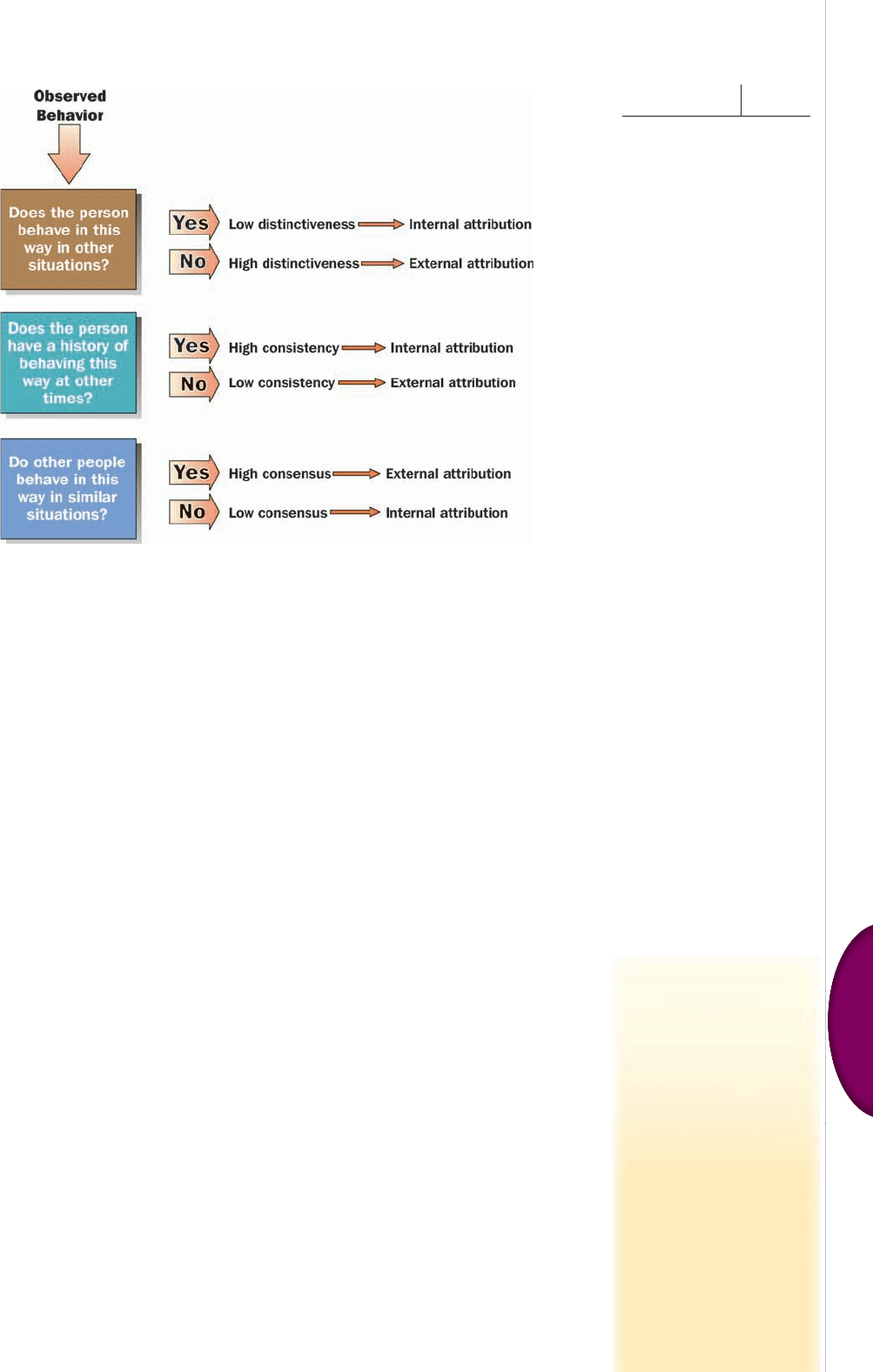
CHAPTER 13 DYNAMICS OF BEHAVIOR IN ORGANIZATIONS 385
5
Leading
1. Distinctiveness. Whether the behavior is unusual for that person (in contrast to a
person displaying the same kind of behavior in many situations). If the behavior
is distinctive, the perceiver probably will make an external attribution.
2. Consistency. Whether the person being observed has a history of behaving in the
same way. People generally make internal attributions about consistent behavior.
3. Consensus. Whether other people tend to respond to similar situations in the same
way. A person who has observed others handle similar situations in the same way
will likely make an external attribution; that is, it will seem that the situation pro-
duces the type of behavior observed.
In addition to these general rules, people tend to have biases that they apply
when making attributions. When evaluating others, we tend to underestimate the
in uence of external factors and overestimate the in uence of internal factors. This
tendency is called the fundamental attribution error. Consider the case of someone
being promoted to CEO. Employees, outsiders, and the media generally focus on
the characteristics of the person that allowed him or her to achieve the promotion.
In reality, however, the selection of that person might have been heavily in uenced
by external factors, such as business conditions creating a need for someone with a
strong nancial or marketing background at that particular time.
Another bias that distorts attributions involves attributions we make about our
own behavior. People tend to overestimate the contribution of internal factors to their
successes and overestimate the contribution of external factors to their failures. This
tendency, called the
self-serving bias, means people give themselves too much credit
for what they do well and give external forces too much blame when they fail. Thus,
if your manager says you don’t communicate well enough, and you think your man-
ager doesn’t listen well enough, the truth may actually lie somewhere in between.
PERSONALITY AND BEHAVIOR
In recent years, many employers showed heightened interest in matching people’s
personalities to the needs of the job and the organization. An individual’s personality
is the set of characteristics that underlie a relatively stable pattern of behavior in
EXHIBIT 13.5
Factors Infl uencing Whether
Attributions Are Internal or
External
f
f
f
f
fu
fu
fun
da
m
e
n
ta
l
att
ri
but
i
o
n
e
e
e
e
err
or
The tendency to
u
u
u
u
u
u
n
d
e
r
e
st
im
ate
t
h
e
infl
ue
n
ce
of
e
e
e
ex
xt
e
e
rn
a
l f
acto
r
s
o
n
a
n
ot
h
e
r’
s
b
b
b
b
e
h
a
vi
o
r
a
n
d
to
o
v
e
r
e
st
im
at
e
t
t
t
h
he
in
fl
u
e
n
ce
o
f
in
te
rn
a
l
f
act
o
r
s
s
.
.
s
s
s
s
s
elf-serving bias
T
he
t
t
t
e
e
n
t
denc
y
to overestimate the
c
c
c
c
co
o
n
c
t
ri
but
i
o
n
o
f in
te
rn
a
l f
acto
r
s
t
t
t
t
o
o
t
o
o
one
one
’
s
s
suc
suc
ces
ces
ses
ses
an
an
dt
d
t
he
he
c
c
c
c
co
o
n
c
t
ri
but
i
o
n
of
e
x
te
rn
al
fa
cto
r
s
t
t
t
o
o
one’s
f
ai
l
ures
.
p
p
p
p
p
ersonalit
y
Th
e
set
o
f
c
h
a
r
ac
c-
-
-
-
t
t
t
e
e
ri
st
i
cs
t
h
at
u
n
de
rli
e
a
r
e
l
a
-
t
t
t
i
i
i
vel
y
stable pattern of behavio
r
r
r
i
i
in
n
n
n
response to i
d
eas, o
bj
ects, o
r
r
p
p
p
p
p
eop
l
e in t
h
e environment.
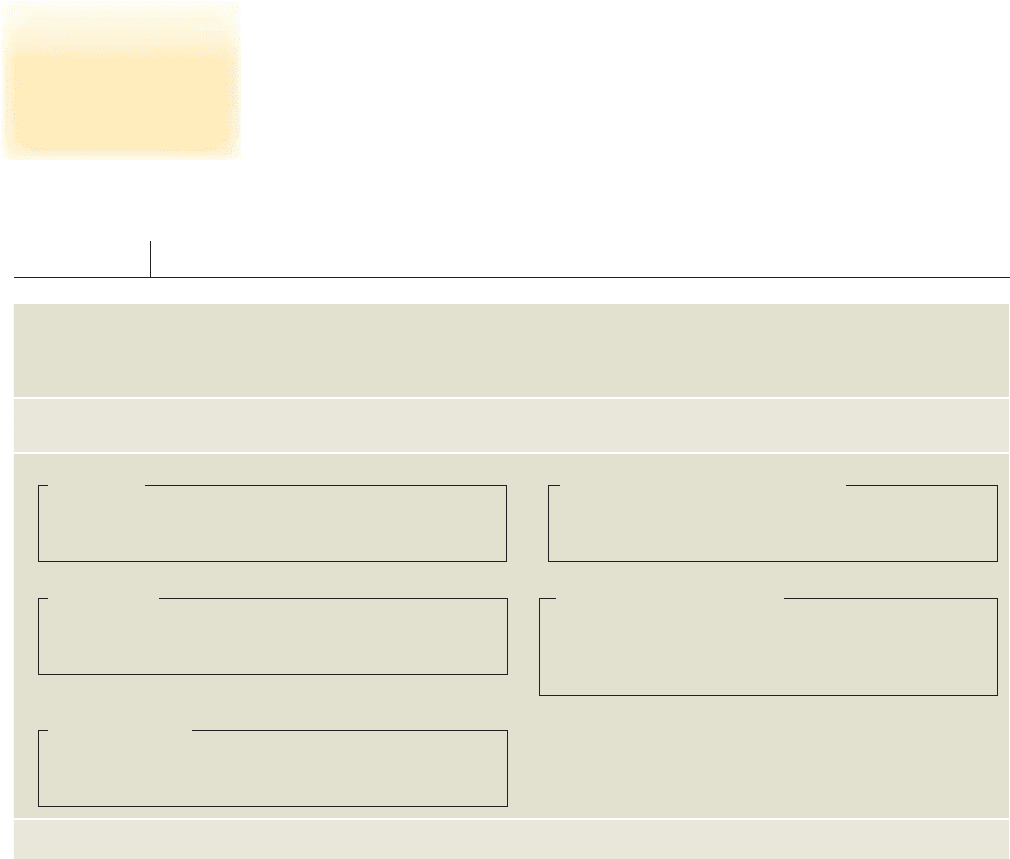
PART 5 LEADING386
response to ideas, objects, or people in the environment. Managers who appreciate
the ways their employees’ personalities differ have insight into what kinds of leader-
ship behavior will be most in uential.
Personality Traits
In common use, people think of personality in terms of traits, the fairly consistent
characteristics a person exhibits. Researchers investigated whether any traits stand
up to scienti c scrutiny. Although investigators examined thousands of traits over
the years, their ndings t into ve general dimensions that describe personality.
These dimensions, often called the “Big Five” personality factors, are illustrated in
Exhibit 13.6.
19
Each factor may contain a wide range of speci c traits. The Big Five
personality factors describe an individual’s extroversion, agreeableness, conscien-
tiousness, emotional stability, and openness to experience:
1. Extroversion. The degree to which a person is outgoing, sociable, assertive, and
comfortable with interpersonal relationships.
2. Agreeableness. The degree to which a person is able to get along with others by
being good-natured, likable, cooperative, forgiving, understanding, and trusting.
3. Conscientiousness. The degree to which a person is focused on a few goals, thus
behaving in ways that are responsible, dependable, persistent, and achievement
oriented.
4. Emotional stability. The degree to which a person is calm, enthusiastic, and self-
con dent, rather than tense, depressed, moody, or insecure.
5. Openness to experience. The degree to which a person has a broad range of
interests and is imaginative, creative, artistically sensitive, and willing to con-
sider new ideas.
EXHIBIT 13.6 The Big Five Personality Traits
Each individual’s collection of personality traits is different; it is what makes us unique. But, although each collection of traits varies,
we all share many common traits. The following phrases describe various traits and behaviors. Rate how accurately each statement
describes you, based on a scale of 1 to 5, with 1 being very inaccurate and 5 very accurate. Describe yourself as you are now, not as
you wish to be. There are no right or wrong answers.
1 2 3 4 5
Very Inaccurate Very Accurate
I am usually the life of the party. 1 2 3 4 5
I feel comfortable around people. 1 2 3 4 5
I am talkative. 1 2 3 4 5
I often feel critical of myself. 1 2 3 4 5
I often envy others. 1 2 3 4 5
I am temperamental. 1 2 3 4 5
I am kind and sympathetic. 1 2 3 4 5
I have a good word for everyone. 1 2 3 4 5
I never insult people. 1 2 3 4 5
I am imaginative. 1 2 3 4 5
I prefer to vote for liberal
political candidates. 1 2 3 4 5
I really like art. 1 2 3 4 5
I am systematic and effi cient. 1 2 3 4 5
I pay attention to details. 1 2 3 4 5
I am always prepared for class. 1 2 3 4 5
Which are your most prominent traits? For fun and discussion, compare your responses with those of classmates.
Extroversion
Agreeableness
Conscientiousness
Neuroticism (Low Emotional Stability)
Openness to New Experiences
B
B
B
B
B
B
Big
Five personality fac
-
t
t
t
t
to
r
s
Dim
Dim
ens
ens
ion
ion
st
s
t
h
hat
hat
d
de
de
scr
scr
b
ibe
e
ibe
e
a
a
a
a
an
n
individual’s extroversion
,
a
a
a
a
ag
g
reea
bl
eness, conscientious-
n
n
n
n
n
es
n
s, emotiona
l
sta
b
i
l
ity, an
d
o
o
o
o
op
op
ope
pe
nness to experience
.
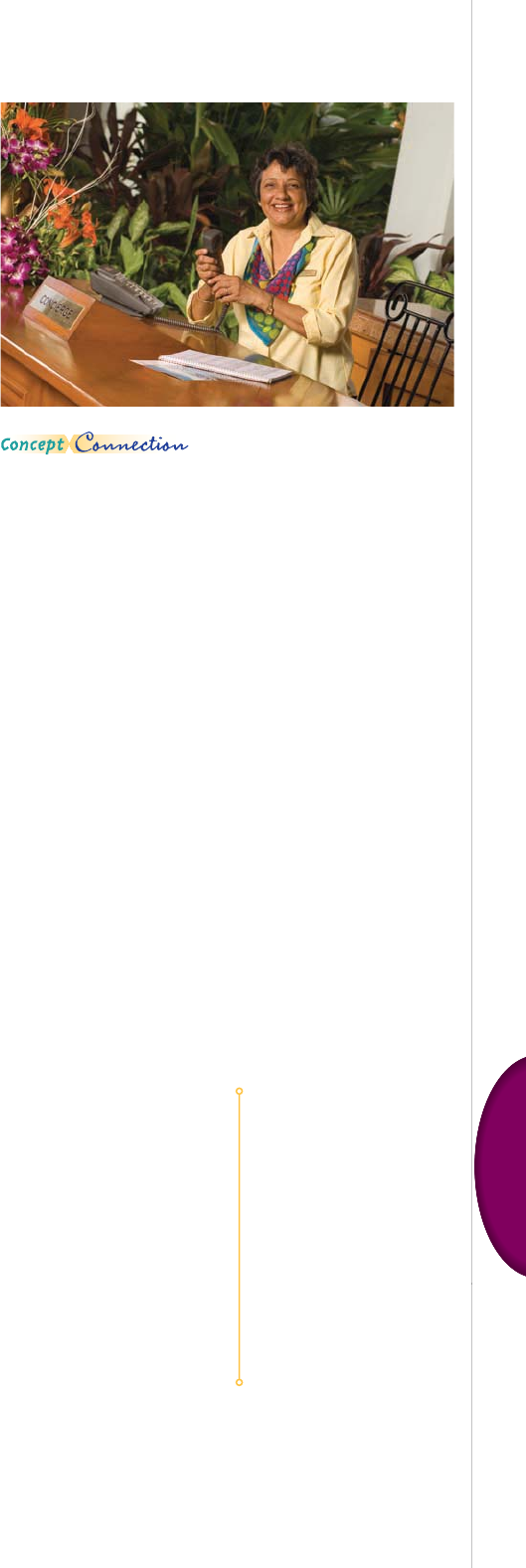
CHAPTER 13 DYNAMICS OF BEHAVIOR IN ORGANIZATIONS 387
5
Leading
As illustrated in the exhibit, these factors represent
a continuum. That is, a person may have a low, mod-
erate, or high degree of each quality. Answer the ques-
tions in Exhibit 13.6 to see where you fall on the Big
Five scale for each of the factors. Having a moderate-to-
high degree of each of the Big Five personality factors
is considered desirable for a wide range of employees,
but this isn’t always a key to success. For example, hav-
ing an outgoing, sociable personality (extraversion) is
considered desirable for managers, but many successful
top leaders, including Bill Gates, Charles Schwab, and
Steven Spielberg, are introverts, people who become
drained by social encounters and need time alone to
re ect and recharge their batteries. One study found
that four in ten top executives test out to be introverts.
20
Thus, the quality of extraversion is not as signi cant as
is often presumed. Traits of agreeableness, on the other
hand, seem to be particularly important in today’s col-
laborative organizations. The days are over when a
hard-driving manager can run roughshod over others
to earn a promotion. Companies want managers who
work smoothly with others and get help from lots of
people inside and outside the organization. Executive
search rm Korn/Ferry International examined data
from millions of manager pro les since the early 2000s
and found that the most successful executives today
are team-oriented leaders who gather information and
work collaboratively with many different people.
21
One recent book argues that the secret to success in work and in life is likability. We
all know we’re more willing to do something for someone we like than for someone
we don’t, whether it is a teammate, a neighbor, a professor, or a supervisor. Manag-
ers can increase their likability by developing traits of agreeableness, including being
friendly and cooperative, understanding other people in a genuine way, and striving
to make people feel positive about themselves.
22
Many companies, including JCPenney, DuPont, Toys “R” Us, and the Union
Paci c Railroad, use personality testing to hire, evaluate, or promote employ-
ees. Surveys show that at least 30 percent of organizations use some kind of per-
sonality testing for hiring.
23
Entrepreneurial companies such as eHarmony are
using sophisticated personality testing to match singles through online dating
services.
Online dating has grown into a half-billion dollar industry in just over ten years. Personality
tests are central to some of these organizations’ strategies, and eHarmony is one of the most
comprehensive at pursuing so-called serious daters, people who are searching for a lasting
relationship.
The eHarmony Compatibility Matching System employs an exhaustive 436-question per-
sonality survey that is based on founder Neil Clark Warren’s past professional experience and
his company’s research into long-lived marriages. Warren, who holds both divinity and clini-
cal psychology degrees, believes the unions most likely to succeed are those between people
who share at least 10 of the 29 personality traits eHarmony measures.
Does the approach work? So far, the only company to track relationships it has helped
create is eHarmony. Claiming to have helped bring about 16,000 marriages in 2005 alone,
the company conducted an in-house study it says showed eHarmony couples enjoyed higher
levels of marital satisfaction than those who had met through other channels.
24
Despite growing use of personality tests, there is so far little hard evidence show-
ing them to be valid predictors of job—or relationship—success.
eHarmony
Innovative Way
© MARRIOTT/DSC
Marriott carefully screens candidates
for critical customer service positions, such as the hotel concierge
shown here. One important way managers determine whether
people have the “right stuff ” is through personality testing.
During the application process, candidates answer a series of
questions about their beliefs, attitudes, work habits, and how
they might handle situations, enabling Marriott to identify people
with interests and motivations that are compatible with company
values. As managers re-evaluate Marriott’s mission and goals,
the test also evolves. Some fear personality tests have too much
infl uence, determining not just who gets hired, but who even gets
an interview.

PART 5 LEADING388
Emotional Intelligence
In recent years, new insights into personality are emerging through research in
the area of emotional intelligence. Emotional intelligence (EQ) includes four basic
components:
25
1. Self-awareness. The basis for all the other components; being aware of what you
are feeling. People who are in touch with their feelings are better able to guide
their own lives and actions. A high degree of self-awareness means you can accu-
rately assess your own strengths and limitations and have a healthy sense of self-
con dence.
2. Self-management. The ability to control disruptive or harmful emotions and
balance one’s moods so that worry, anxiety, fear, or anger do not cloud think-
ing and get in the way of what needs to be done. People who are skilled at
self-management remain optimistic and hopeful despite setbacks and obsta-
cles. This ability is crucial for pursuing long-term goals. MetLife found that
applicants who failed the regular sales aptitude test but scored high on opti-
mism made 21 percent more sales in their rst year and 57 percent more in
their second year than those who passed the sales test but scored high on
pessimism.
26
3. Social awareness. The ability to understand others and practice empathy, which
means being able to put yourself in someone else’s shoes, to recognize what oth-
ers are feeling without them needing to tell you. People with social awareness
are capable of understanding divergent points of view and interacting effectively
with many different types of people.
4. Relationship management. The ability to connect to others, build positive rela-
tionships, respond to the emotions of others, and in uence others. People with
relationship management skills know how to listen and communicate clearly, and
they treat others with compassion and respect.
Studies show a positive relationship between job performance and high lev-
els of emotional intelligence in a variety of jobs. Numerous organizations, includ-
ing the U.S. Air Force and Canada Life, use EQ tests to measure such things as
self-awareness, ability to empathize, and capacity to build positive relationships.
27
Altera Corporation uses “empathy coaches” to help its salespeople develop greater
social awareness and see things from their customers’ point of view.
28
EQ seems to
be particularly important for jobs such as sales that require a high degree of social
interaction. It’s also critical for managers, who are responsible for in uencing oth-
ers and building positive attitudes and relationships in the organization. Managers
with low emotional intelligence can undermine employee morale and harm the
organization.
Complete the New Manager Self-Test on page 389 to assess your own level of
emotional intelligence. You might also want to refer back to the questionnaire related
to self-confi dence at the beginning of this chapter. Self-confi dence strongly infl uences
a new manager’s EQ.
Attitudes and Behaviors Infl uenced by Personality
An individual’s personality in uences his or her work-related attitudes and behav-
iors. As a new manager, you will have to manage people with a wide variety of per-
sonality characteristics. This chapter’s Shoptalk discusses how managers can cope
with the challenge of bridging personality differences. Four areas related to personal-
ity that are of particular interest to managers are locus of control, authoritarianism,
Machiavellianism, and problem-solving styles.
TakeaMoment

CHAPTER 13 DYNAMICS OF BEHAVIOR IN ORGANIZATIONS 389
5
Leading
What’s Your EQ?
Understanding yourself and others is a major part
of new manager’s job. To learn about your insights
into self and others, answer each item below as
Mostly True or Mostly False for you.
Mostly
True
Mostly
False
1. I am aware of sensations
and emotions within my
body.
2. I am slow to react to
others’ slights or nega-
tive actions toward me.
3. I can tell my friends’
moods from their
behavior.
4. I am good at build-
ing consensus among
others.
5. I have a good sense
of why I have certain
feelings.
6. I calm down right away
if upset and am quick to
forgive.
7. I often sense the impact
of my words or behavior
on others.
8. Other people are hap-
pier when I am around.
SCORING AND INTERPRETATION: The cat-
egories of emotional intelligence are below. Give
yourself one point for each item marked Mostly
True.
Self-Awareness: Items 1, 5
Self-Management: Items 2, 6,
Social Awareness: Items 3, 7
Relationship Management: Items 4, 8
These are the four dimensions of EQ described in
the text. If you scored 2 on a dimension, you prob-
ably do well on it. If you scored 0 on a dimension,
you may want to work on that aspect of your EQ
before becoming a manager. The important thing
as a manager is to know and guide yourself, to
understand the emotional state of others, and to
guide your relationships in a positive direction.
New ManagerSelf-Test
Locus of Control People differ in terms of what they tend to accredit as
the cause of their success or failure. Their locus of control de nes whether
they place the primary responsibility within themselves or on outside forc-
es.
29
Some people believe that their own actions strongly in uence what
happens to them. They feel in control of their own fate. These individuals
have a high internal locus of control. Other people believe that events in their
lives occur because of chance, luck, or outside people and events. They feel
more like pawns of their fate. These individuals have a high external locus
of control.
Research on locus of control shows real differences in behavior across a
wide range of settings. People with an internal locus of control are easier to
motivate because they believe the rewards are the result of their behavior.
l
l
l
l
lo
lo
loc
us o
f
contro
l
Th
e
te
n-
d
d
d
d
d
d
en
d
c
y
to p
l
ace t
h
e primar
y
r
r
r
re
e
s
p
on
p
si
b
i
l
it
y
y
f
or one’s success
o
o
o
o
r
o
o
f
ai
l
ure eit
h
er wit
h
in onese
lf
(
(
(i
(i
i
n
(
(
ternally
)
or on outside force
s
s
s
s
(
(
(e
ex
(
(
(e
ex
ter
ter
nal
nal
ly)
ly)
.
.
